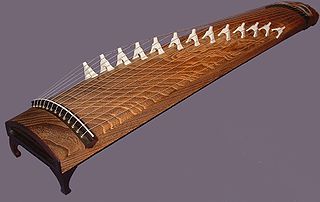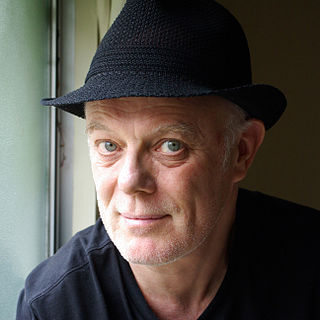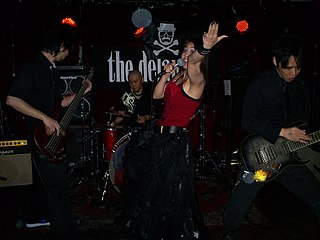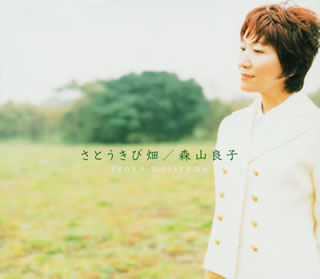Related Research Articles

The koto is a Japanese plucked half-tube zither instrument, and the national instrument of Japan. It is derived from the Chinese zheng and se, and similar to the Mongolian yatga, the Korean gayageum and ajaeng, the Vietnamese đàn tranh, the Sundanese kacapi and the Kazakhstan jetigen. Koto are roughly 180 centimetres (71 in) in length, and made from Paulownia wood. The most common type uses 13 strings strung over movable bridges used for tuning, different pieces possibly requiring different tuning. 17-string koto are also common, and act as bass in ensembles. Koto strings are generally plucked using three fingerpicks, worn on the first three fingers of the right hand.

Princess Mononoke is a 1997 Japanese animated epic historical fantasy film written and directed by Hayao Miyazaki and animated by Studio Ghibli for Tokuma Shoten, Nippon Television Network and Dentsu. The film stars the voices of Yōji Matsuda, Yuriko Ishida, Yūko Tanaka, Kaoru Kobayashi, Masahiko Nishimura, Tsunehiko Kamijo, Akihiro Miwa, Mitsuko Mori and Hisaya Morishige.

Yoko Ono is a Japanese multimedia artist, singer, songwriter, and peace activist. Her work also encompasses performance art and filmmaking.
Akiko Yano is a Japanese pop and jazz musician and singer born in Tokyo and raised in Aomori and later began her singing career in the mid-1970s. She has been called "one of the major musical talents of the Japanese popular music world", and her vocals and singing style have been compared to British singer Kate Bush.
Enka (演歌) is a Japanese music genre considered to resemble traditional Japanese music stylistically. Modernenka, however, is a relatively recent musical form, which adopts a more traditional musical style in its vocalism than ryūkōka music, popular during the prewar years.

Yoko Shimomura is a Japanese composer and pianist primarily known for her work in video games. She graduated from the Osaka College of Music in 1988 and began working in the video game industry by joining Capcom the same year. She wrote music for several games there, including Final Fight, Street Fighter II, and The King of Dragons.

Yoko Kanno is a Japanese composer, arranger and music producer best known for her work on the soundtracks of anime series, television series, live-action films, video games, and advertisements. She was born in Sendai, Miyagi Prefecture, Japan. She has written scores for Cowboy Bebop and its live-action adaptation, Darker than Black, Macross Plus, Turn A Gundam, The Vision of Escaflowne, Ghost in the Shell: Stand Alone Complex, Wolf's Rain, Kids on the Slope,Genesis of Aquarion and Terror in Resonance, and has worked with the directors Hirokazu Kore-eda, Yoshiyuki Tomino, Shinichirō Watanabe and Shōji Kawamori. Kanno has also composed music for pop artists Maaya Sakamoto and Kyōko Koizumi. She is also a keyboardist, and is the frontwoman for the Seatbelts, who perform many of Kanno's compositions and soundtracks.Meow on the Bridge is her private office.

Anthony Frederick Levin is an American musician and composer, specializing in electric bass, Chapman Stick and upright bass. He also sings and plays synthesizer. Levin is best known for his work with King Crimson and Peter Gabriel. He is also a member of Liquid Tension Experiment, Bruford Levin Upper Extremities (1998–2000) and HoBoLeMa (2008–2010). He has led his own band, Stick Men, since 2010.

Miwa Watabiki, better known by her stage name Chara, is a Japanese singer, actress and video jockey. She debuted in 1991 with the single Heaven. She is known for her song "Swallowtail Butterfly ", the theme song for the 1996 Shunji Iwai film Swallowtail Butterfly in which she starred, her 1997 hit single "Yasashii Kimochi", and her collaboration with Judy and Mary vocalist Yuki, "Ai no Hi Mittsu Orange". Chara later formed a band with Yuki, called Mean Machine.

Yuka Honda is a Japanese-American musician who resides in New York City. She is a multi-instrumentalist, composer, record producer, and co-founder of the band Cibo Matto. Throughout her career, she has collaborated with a diverse array of musicians, including Petra Haden, Sean Lennon, Mike Watt, Nels Cline, Tricky, Harper Simon, Beastie Boys, Los Lobos, Brooklyn Funk Essentials, Mitchell Froom, Medeski Martin & Wood, Marc Ribot, Yoshimi P-We, Arto Lindsay, Edie Brickell, Vincent Gallo, Luscious Jackson, Dave Douglas, Bernie Worrell, and Caetano Veloso.

Yoko Ono/Plastic Ono Band is the debut studio album by Japanese artist and musician Yoko Ono, released on Apple Records in December 1970. It was released simultaneously with her husband's album John Lennon/Plastic Ono Band. Backed by the Plastic Ono Band and, on one track, the Ornette Coleman Quartet, it followed the release of three experimental albums with Lennon and a live album from the 1969 version of the Plastic Ono Band. In the United States, it peaked at number 182 on the Billboard Top LPs chart.

Yoko Takahashi is a Japanese singer, who is best known for her work throughout the 1990s, most particularly for her singles which were performed for and featured in anime, most notably the Neon Genesis Evangelion franchise.

Yui, stylized as YUI or yui, is a Japanese singer-songwriter and multi-instrumentalist. In her solo career, she sold more than 5 million physical copies in Japan. She is popular in Japan and in surrounding countries, ranking number one in 2011 Count Down TV "Dearest Female Artist" and Music Station "Artist You Most Want to Marry" polls, as well as Radio Television Hong Kong's "Most Popular Japanese Artist".
Japanese jazz is jazz played by Japanese musicians and connected to Japan or Japanese culture. The term often refers to the history of jazz in Japan, which has the largest proportion of jazz fans in the world, according to some estimates. Attempts at fusing jazz with Japanese culture in the United States are commonly termed Asian-American jazz.
Soul Flower Union, also known as SFU, is a Japanese musical group that incorporates Asian styles and world music styles into a rock and roll band. They are known for their blend of psychedelic, rock, Okinawan music, Celtic music, chindon, swing jazz, as well as Japanese, Chinese and Korean folk musics. Most of their songs are written and performed in Japanese, although they are fond of using phrases from a number of other languages, including English, French, Italian, Korean, Arabic and Ainu.

Stephen Morgan Fisher is an English keyboard player and composer, and is most known as a member of Mott the Hoople in the early 1970s. However, his career has covered a wide range of musical activities, and he is still active in the music industry. In recent years he has expanded into photography.

Head Phones President is a Japanese metal band formed in Tokyo in 1999. Their sound has been described as alternative metal, progressive metal, avant-garde metal, and nu metal.

Mononoke (モノノ怪) is a Japanese avant-garde anime television series produced by Toei Animation. A spin-off of 2006's horror anthology series Ayakashi: Samurai Horror Tales, Mononoke follows the character of the medicine seller as he continues to face a myriad of supernatural perils. Mononoke takes place between the end of the Edo period and Meiji Era of Japan with the four class system, Samurai being the highest class and merchants being in the lowest class. Only Samurai were permitted to carry swords, which is why it comes as a shock to many of the characters that the medicine seller would be carrying a sword.

"Nada Sōsō" is a song written by Japanese band Begin and singer Ryoko Moriyama. It was first released by Moriyama in 1998, but achieved popularity through the cover version by Rimi Natsukawa in 2001.
Keiko Terada is a Japanese rock singer. She was co-founder and lead singer of the successful Japanese female hard rock and heavy metal band Show-Ya from 1982 to 1991, before going solo. On her solo albums she expanded from hard rock and heavy metal to blues, pop and soul.